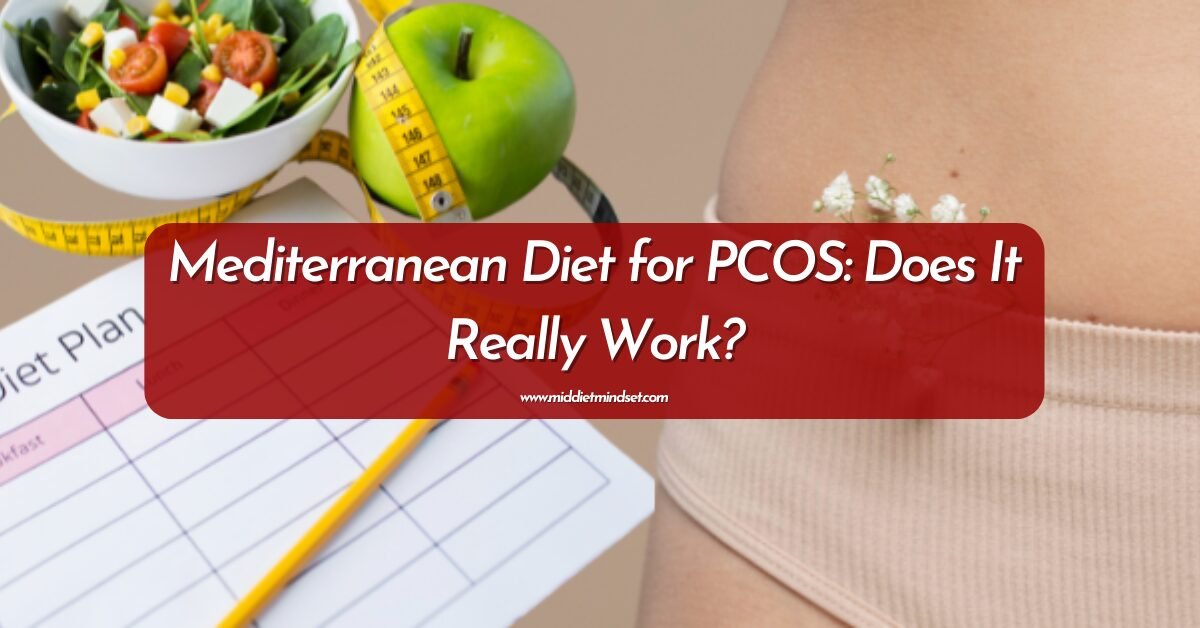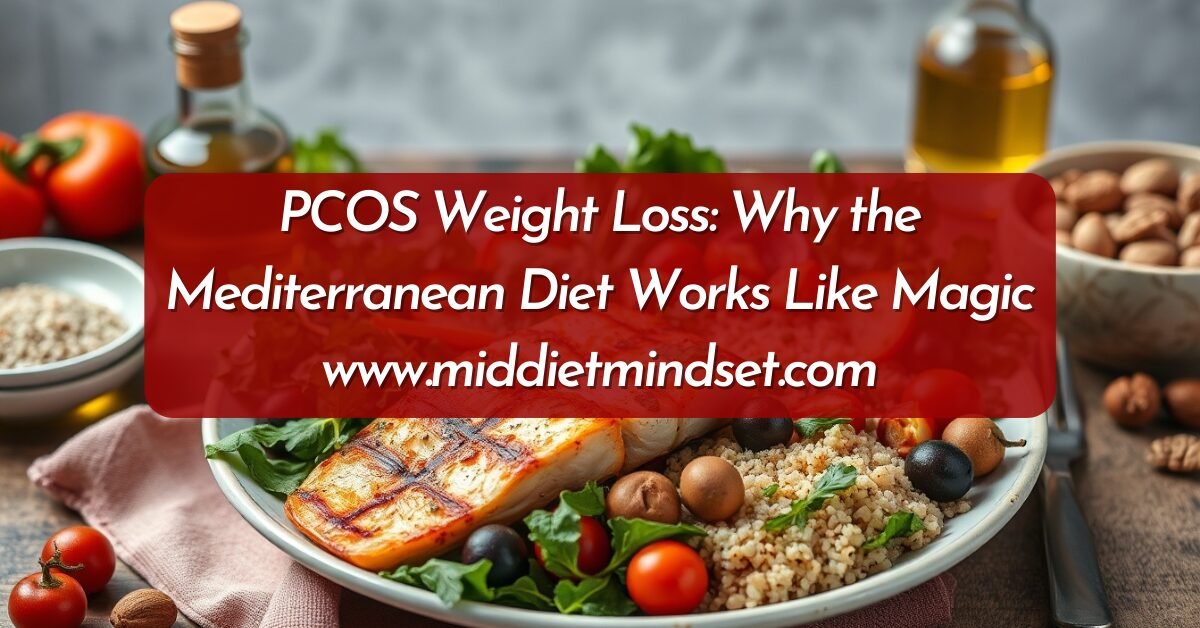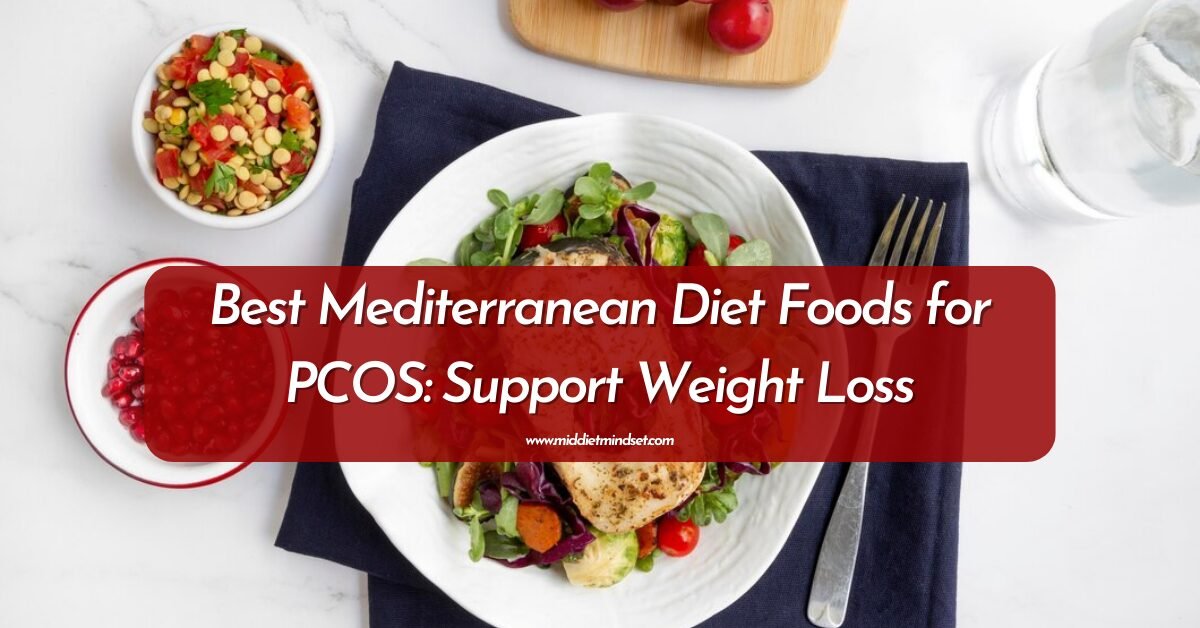Table of Contents
ToggleIf you’re navigating the world of PCOS (Polycystic Ovary Syndrome), you know how frustrating it can be. From hormonal imbalances to stubborn weight gain, the symptoms can feel overwhelming. But what if I told you that a simple shift in your diet could make a real difference? Enter the Mediterranean diet for PCOS—a way of eating that has gained traction not just for its deliciousness but also for its potential benefits in managing PCOS. So, let’s dive into the question: Does the Mediterranean diet really work for PCOS?
Understanding PCOS and Its Challenges
Before we get into the Mediterranean diet for PCOS, let’s talk about what PCOS is and why it can be a tough journey for those dealing with it. PCOS affects about 1 in 10 women (11.5%) of childbearing age worldwide 1, and its symptoms can include irregular periods, weight gain, acne, and hair growth in unwanted areas. Many women with PCOS also struggle with insulin resistance, which makes it harder to lose weight and can lead to other health complications down the line
I remember when I first started working with clients who had PCOS. Many expressed feeling lost and frustrated, especially when it came to weight management. They often felt as if they were fighting an uphill battle. But the good news? With the right dietary approach, like the Mediterranean diet, you can take significant steps toward managing your symptoms and achieving sustainable weight loss
What Is the Mediterranean Diet for PCOS?
So, what exactly is the Mediterranean diet for PCOS? It’s not just a fad; it’s a lifestyle rooted in the traditional eating habits of countries bordering the Mediterranean Sea, like Italy and Greece. Here are the key components:
A Focus on Whole Foods
The Mediterranean diet for PCOS emphasizes whole foods, such as:
- Fruits and vegetables: Aim for a rainbow of colors to ensure a wide range of nutrients.
- Whole grains: Think brown rice, quinoa, and whole-grain pasta.
- Healthy fats: Olive oil is a staple here, along with nuts and seeds.
- Lean proteins: Fish, poultry, legumes, and dairy are encouraged, while red meat is limited.
The Power of Healthy Fats
One of the most appealing aspects of the Mediterranean diet for PCOS is its focus on healthy fats. Instead of avoiding fats altogether, you’ll incorporate sources of monounsaturated fats (like olive oil) that can help improve cholesterol levels and reduce inflammation. This is particularly important for women with PCOS, as inflammation can exacerbate symptoms.

The Mediterranean Diet and PCOS: The Evidence
Now, let’s talk about why the Mediterranean diet for PCOS might be beneficial. Research is beginning to back up what many of us have intuitively felt: this way of eating can help.
Research Findings
Several studies have shown that adopting the Mediterranean diet for PCOS can lead to significant improvements in insulin sensitivity and hormonal balance. In fact, a comprehensive review published in Current Nutrition Reports in 2023 highlighted the Mediterranean diet for PCOS as a “gold standard” due to its anti-inflammatory, anti-obesogenic, and antioxidant properties 2. The review emphasized that the Mediterranean diet for PCOS, with its regular consumption of unsaturated fats, fiber, and antioxidants, is an optimal strategy for managing conditions closely linked to PCOS, including obesity and insulin resistance (IR).
Real-Life Success Stories
I’ve worked with clients who made the switch to the Mediterranean diet for PCOS and saw remarkable changes. One of my clients, Sarah, struggled with weight management and insulin resistance. After a few months of following the Mediterranean diet, she reported not just weight loss but also feeling more energized and balanced. The foods she enjoyed were not only delicious but also aligned with her health goals. She often said:
Implementing the Mediterranean Diet for Sustainable Weight Loss
So, how can you start incorporating the Mediterranean diet for PCOS into your life? Here are some practical tips:
Meal Planning and Preparation
Plan Your Meals
Set aside time each week to plan your meals. Focus on including a variety of colourful fruits and vegetables, whole grains, and healthy proteins in your Mediterranean diet.
Prep in Batches
Cooking in bulk can save you time and ensure you have healthy meals ready to go. Consider making a big batch of quinoa or roasting a variety of veggies at the beginning of the week.
Experiment with Recipes
Try new Mediterranean recipes for PCOS each week. Dishes like Greek salads, lentil soups, or baked fish with herbs can keep things exciting.
Building Sustainable Habits
Transitioning to a new way of eating can feel daunting, but it doesn’t have to be! Here are some strategies to build sustainable habits with the Mediterranean diet:
Start Small
Don’t feel like you have to overhaul your entire diet overnight. Begin by incorporating one or two Mediterranean meals for PCOS each week and gradually increase from there.
Mindful Eating
Take time to enjoy your meals. Savouring your food can improve digestion and help you feel more satisfied.
Physical Activity
Pairing your dietary changes with regular physical activity can amplify results. Whether it’s walking, dancing, or yoga, find something you enjoy.

Potential Challenges and Solutions
Of course, every journey has its challenges. Here are some common obstacles you might face and how to tackle them:
Common Obstacles
Cost
Fresh produce and whole foods can be pricier than processed options.
Accessibility
Not everyone has easy access to Mediterranean staples.
Time Constraints
Meal prepping might feel like a time-consuming task.
Strategies to Overcome These Challenges
Budget-Friendly Tips
Buy seasonal produce and shop at local markets. Frozen fruits and veggies can also be a cost-effective option without sacrificing nutrition.
Quick and Easy Options
Keep your pantry stocked with staples like canned beans, whole-grain pasta, and frozen fish to whip up quick meals that fit into your Mediterranean diet for PCOS.
Prioritise Meal Prep
Start with just one meal a week and build from there. Even preparing ingredients in advance can save time during busy weekdays.
Conclusion
So, does the Mediterranean diet really work for PCOS? The evidence points toward a resounding yes! With its focus on whole, nutrient-dense foods, the Mediterranean diet for PCOS can help manage symptoms, promote sustainable weight loss, and improve overall well-being. Remember, it’s not about perfection but rather progress and finding what works for you.
If you’re feeling inspired, I encourage you to explore the Mediterranean diet. Whether you’re looking for delicious recipes or personalised guidance, don’t hesitate to reach out. Your journey toward managing PCOS and achieving sustainable weight loss can start today.
For more information, recipes, and tips tailored specifically for PCOS, check out our blog. Your health journey is unique, and there’s plenty of support available to help you succeed!
F.A.Q.
“PCOS affects about 1 in 10 women (11.5%) of childbearing age, and its symptoms can include irregular periods, weight gain, acne, and hair growth in unwanted areas. Many women with PCOS also struggle with insulin resistance, which makes it harder to lose weight and can lead to other health complications down the line.”
“The good news? With the right dietary approach, like the Mediterranean diet for PCOS, you can take significant steps toward managing your symptoms and achieving sustainable weight loss.”
“Several studies have shown that adopting the Mediterranean diet for PCOS can lead to significant improvements in insulin sensitivity and hormonal balance. In fact, a comprehensive review published in Current Nutrition Reports in 2023 highlighted the Mediterranean diet for PCOS as a “gold standard” due to its anti-inflammatory, anti-obesogenic, and antioxidant properties. The review emphasized that the Mediterranean diet for PCOS, with its regular consumption of unsaturated fats, fiber, and antioxidants, is an optimal strategy for managing conditions closely linked to PCOS, including obesity and insulin resistance (IR).”

Nour is a registered dietitian, nutrition researcher, and founder of MedDietMindset. With a passion for evidence-based nutrition, she specializes in Mediterranean diet strategies, PCOS management, and sustainable weight loss. Nour is dedicated to transforming complex scientific research into clear, actionable guidance to support healthier, long-lasting lifestyle changes. Through her blog, she empowers readers to build habits that prioritize well-being, balance, and vitality.



Pingback: Best Diet in 2025: Your Roadmap to a Healthier New Year – MedDiet Mindset